During the spring and summer, our coop is overflowing with freshly laid eggs…so many eggs!
As an experienced chicken keeper, I know that our wealth of eggs won’t last forever, and by late-fall, all of our hens’ efforts tend to take a hiatus, and it’s like they go into an egg-laying hibernation.
Once you have owned chickens for a time, you will become aware of your chickens’ laying habits. Not all chickens stop laying in the winter months, but in my experience, most of them do. When this happens, we homesteaders are left to fend for ourselves.
What if instead of waiting for the “no egg months”, we prepared for them?
One of the best ways to preserve a large number of fresh eggs is called water glassing. I know it sounds more like an art and craft project, but it is actually a historical way to preserve your fresh eggs.
If you’re curious about different ways to preserve eggs, in this video (below), I compare/contrast water glassing eggs, dehydrating eggs, and freezing eggs. Check it out if you’re curious about my discoveries on the three types of egg preservation!
What is Water Glassing?
Water Glassing is an old-fashioned method of preserving farm fresh eggs that dates back to the 1800s. Back then, it was common to use sodium silicate to make water glassing solutions. Sodium silicate is a type of concrete sealer that has many different uses; including being the original preservation item for water glassing eggs.
Today, calcium hydroxide, better known as pickling lime, is more commonly used to make water glassing solutions. Pickling lime is a white powder that was originally used in old pickle recipes. I personally prefer to use pickling lime because it is a more natural and less-sketchy-chemical option than the older use of sodium silicate.
NOTE: there are different types of lime out there, and only food-grade pickling lime should be used for water glassing. You can usually find pickling lime in the canning equipment section of nearby stores that sell canning equipment or you can purchase it online.
Both water glassing solutions are mixed in a container where eggs are then submerged. This process is used to seal the eggshells to prevent bacteria from entering the egg. Water glassing eggs is a preservation method that is used to store fresh eggs for an extended period of time.
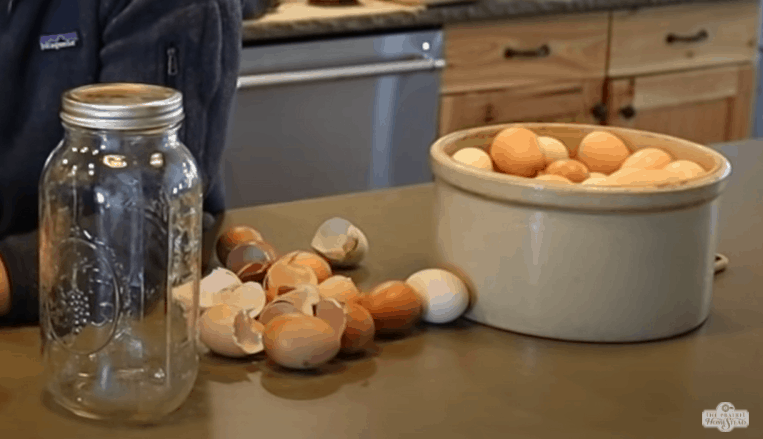
What Eggs Can Be Water Glassed?
Any type of poultry egg can be preserved using the water glassing method. The eggs must be fresh, clean of any debris, but unwashed (unwashed is important!). You cannot use store-bought eggs for water glassing because eggs from the store have been washed and bleached, which destroys the eggs bloom coating.
What is the bloom coating and why is important?
Some folks don’t realize that eggshells are porous, meaning they are made up of tons of little pores. The bloom is the outer coating that protects the egg from air and bacteria entering through these pores. Washing your eggs will destroy the bloom coating, which will allow the lime to enter the egg during the water glassing process.
The bloom coating is sealed in place by the water and lime mixture during water glassing, leaving you with eggs ready for storage in your pantry. No bloom coating means no good when water glassing eggs.
Are Water Glassing Eggs Safe?
Water glassed eggs that have been submerged in a lime and water solution are safe to consume. Your water-glassed eggs should be washed well before using them because ingesting pickling lime is not good for you. One thing you should look out for are cracks in any of your eggs. Even the smallest crack can contaminate an entire batch of water glassed eggs.
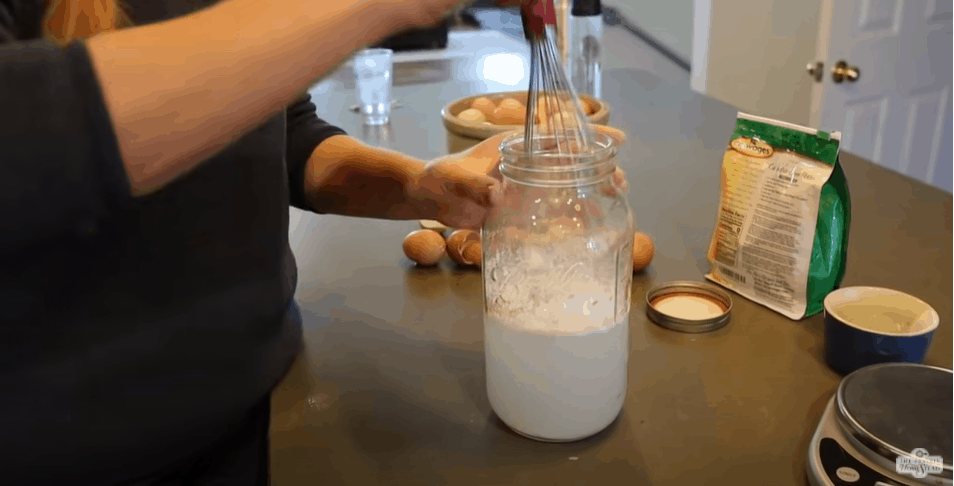
Materials Needed For Water Glassing Eggs
Glass Jars or Food-Grade Bucket – The size of the container depends on the number of eggs you plan to preserve. Keep in mind that 1 quart of water glassing solution will cover about 15 chicken eggs.
Pickling Lime (Calcium Hydroxide) – This type of lime can sometimes be found with canning and preserving equipment in stores, or you can always look online.
Note: Sodium Silicate is still available to use for water glassing eggs. My instructions below are for the use of pickling lime which is more commonly used and it is my preferred method for water glassing eggs.
Water – Your water needs to be chlorine-free and fluoride-free. If you have good well water, there are no worries, but if you live in a city where fluoride is an additive, you can boil your water. You can also buy distilled or natural spring water from the store to be safe.
Eggs – Any type of fresh, unwashed, clean eggs will work for water glassing.
Note: You do not have to collect all your eggs the same day you make the water glassing solution. You can add eggs as you gather them.
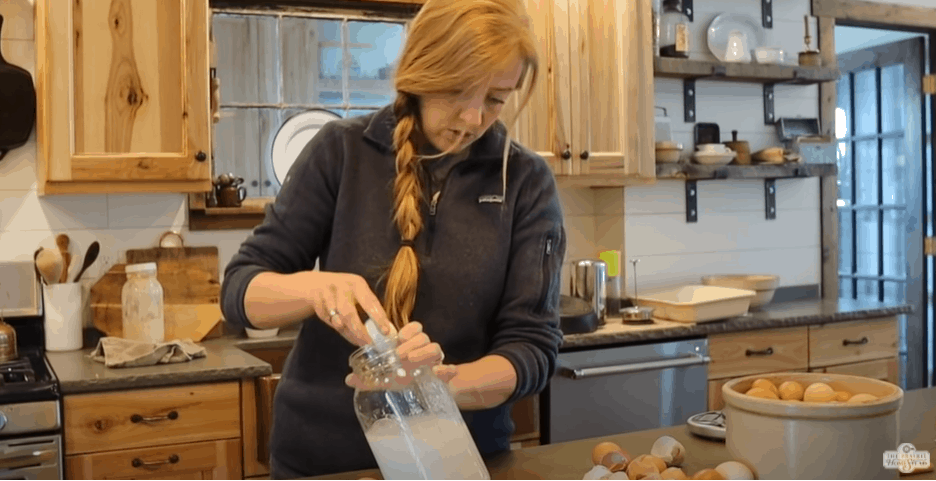
How To Water Glass Eggs
Ingredients:
- Airtight Container (Glass Jar or Food Grade Bucket)
- Kitchen Scale (For Measuring Pickling Lime)
- Pickling Lime
- Water (Natural or Distilled: must be chlorine-free and fluoride-free)
- Eggs (Fresh, Clean, Unwashed)
Instructions:
Step 1: Mix Water and Pickling Lime (1 quart water to 1 ounce lime ratio)
In your chosen container, add a ratio of 1-quart water and 1-ounce lime. (This ratio is going to be used no matter how much of the solution you make.) You will want to make sure you have enough solution to cover your eggs by 2 inches. Mix the water and lime until completely dissolved.
Step 2: Gently Add the Eggs
You will gently place your eggs pointy side down and fat side up (aka Air Sack Side Up) in the lime-water solution. If one egg cracks, it will destroy the entire batch. SO DO THIS GENTLY!
Step 3: Secure the Lid and Store
Secure the lid on your air-tight container and then store your water glassed eggs in a cool and dark place until you need some farm-fresh eggs!
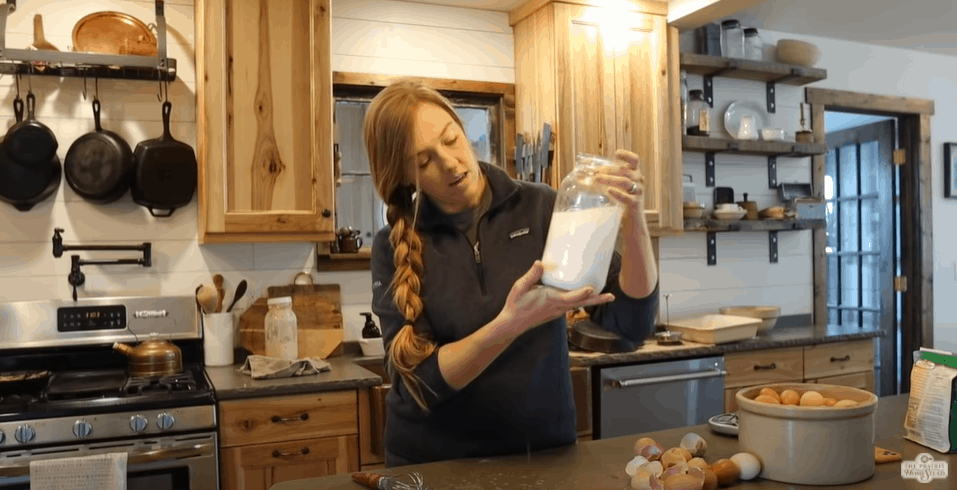
Using Your Water Glassed Eggs
Water glassed eggs can be used exactly how you would use eggs just collected from the coop, except if you are boiling your eggs. Water glassed eggshells have been completely sealed, so you will want to make a small hole in the shell to prevent exploding when hard-boiling your eggs.
When you are ready to use your preserved eggs, take them out of your container and wash them well. You do not want any lime water left on the eggs you are using. If you know that you will need eggs later in the week, you can pull some out and store them in the refrigerator for a few days.
How Long Do Water Glassed Eggs Last?
Fresh eggs with the bloom intact can be stored on the counter for about a month and refrigerated for up to six months. Eggs that are preserved with the water glassing method can last up to a year or more. The water glassing method seals the eggshell, keeping them fresh just like eggs just laid.
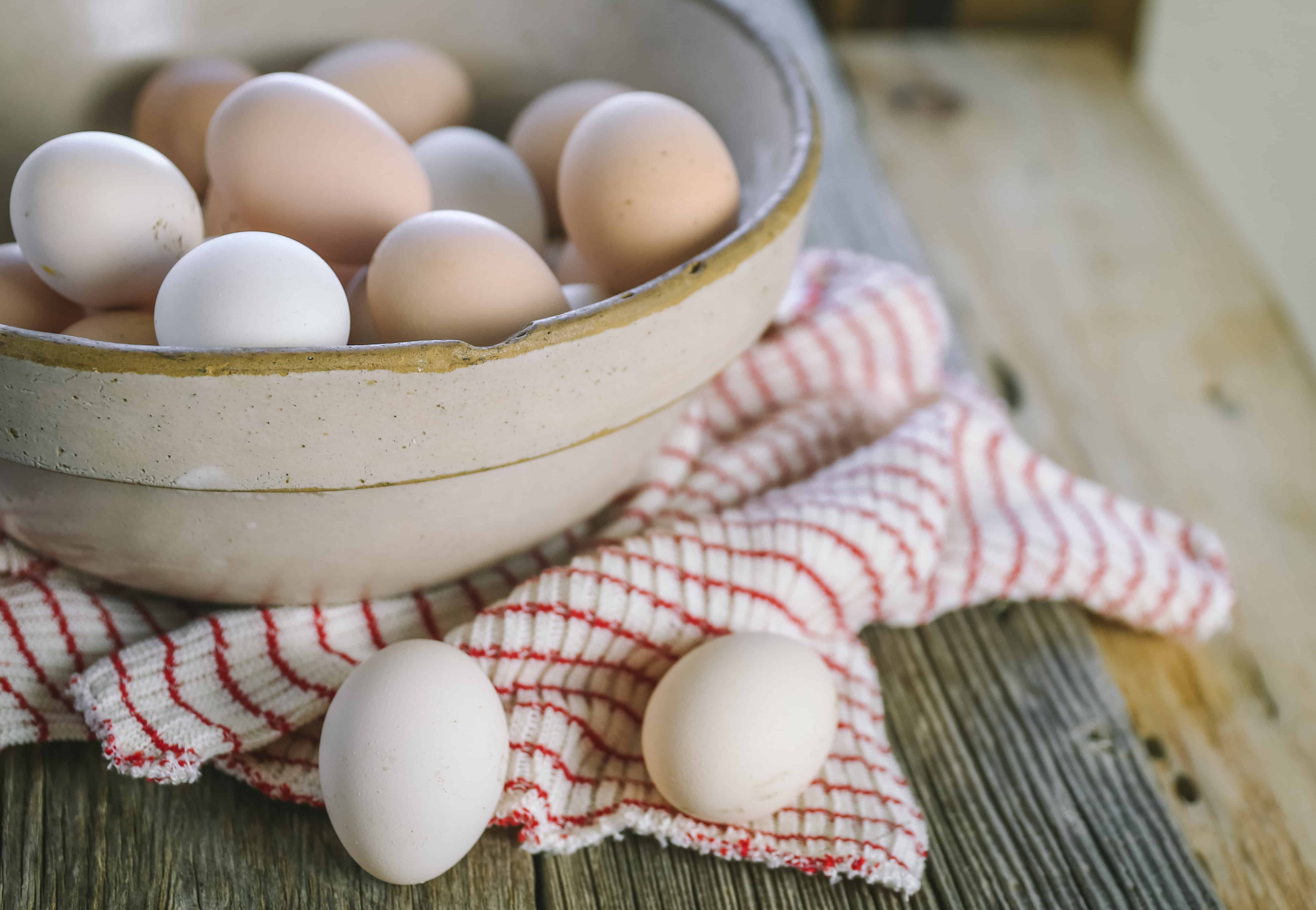
What If I Don’t Have Chicken Eggs?
No chicken eggs, no problem!
Any type of poultry eggs can be preserved using the water glassing method. If you raise ducks or quails, their eggs will work too. Just keep in mind that duck eggs are larger and will need more space when choosing your container for water glassing!
No farm-fresh eggs?
Local farmers all over the country are selling farm fresh eggs, you will likely see a sign hanging at the end of their drive or an advertisement somewhere. If you find a local farm nearby selling eggs, stop and talk to the farmer. Ask them about their collecting practices and if you could purchase unwashed, clean eggs from them.
Need help finding local food sources? Check out my article on How to Find Local Food Sources to get some tips on how to connect with your local farmers.
When Should You Collect Your Eggs?
As mentioned earlier, you can make your water glassing solution and continuously add eggs as you collect them. If your goal is to prep for your chicken’s winter laying hiatus, I recommend starting in late spring. This is the time of year we start getting flooded with eggs!
Before you start collecting eggs for preservation, you should consider the number of eggs you use in your daily life. You will want to keep in mind that you will be collecting your eggs for both current use and collecting eggs for preservation.
If you don’t have many chickens and you need to collect for use during the summer months, how many eggs will that leave you for preserving? If you are being flooded with more eggs than you can use, decide carefully the balance for which eggs to keep for eating now and which to preserve with water glassing.
Maybe Water Glassing Eggs Isn’t Right For You…
Maybe you have decided that water glassing eggs isn’t the right preservation method for you. Well that’s totally okay. There are other ways for you to preserve your eggs. Two different methods for preserving eggs that I have tried before are freezing and dehydrating.
To learn more about my experience with these two different methods of preserving eggs you can read How to Freeze Eggs and How to Dehydrate Eggs.
Water Glassing Eggs as a Preservation Method: Final Thoughts
Are you ready to start preserving eggs for those short winter days when there are no eggs to be found?
Water glassing requires little time, very few supplies, and is a simple way to preserve your extra eggs for long-term storage. If you have made the decision that water glassing is right for you, just remember only fresh, unwashed eggs will do.
Preserving eggs for long-term storage is not a new activity in the homestead kitchen. All of the different methods and instructions can leave you a bit overwhelmed or confused. If you are looking for help overcoming your egg preserving confusion, listen to Taking the Confusion Out of Egg Preservation from my Old-Fashioned on Purpose Podcast.
More Articles about Preserving Your Fresh Eggs:
- Eggs: To Wash or Not to Wash?
- Do You Have to Refrigerate Eggs?
- 50+ Ways to Use Extra Eggs
- What are Those Spots in my Farm-Fresh Eggs?
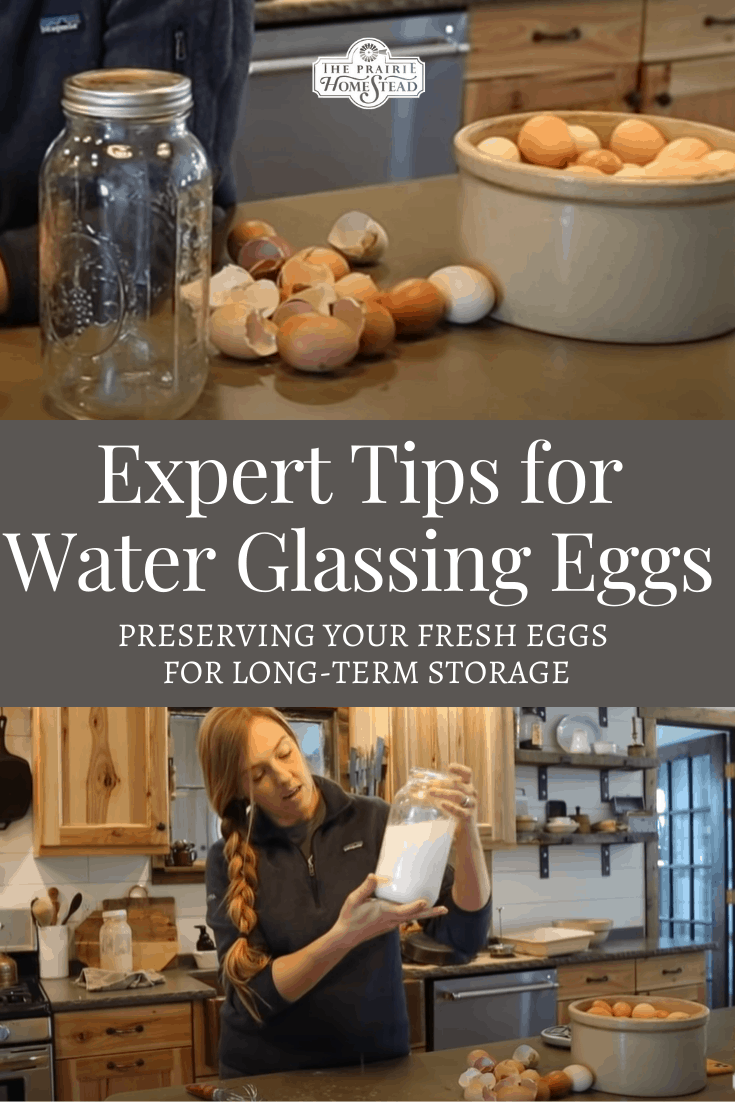
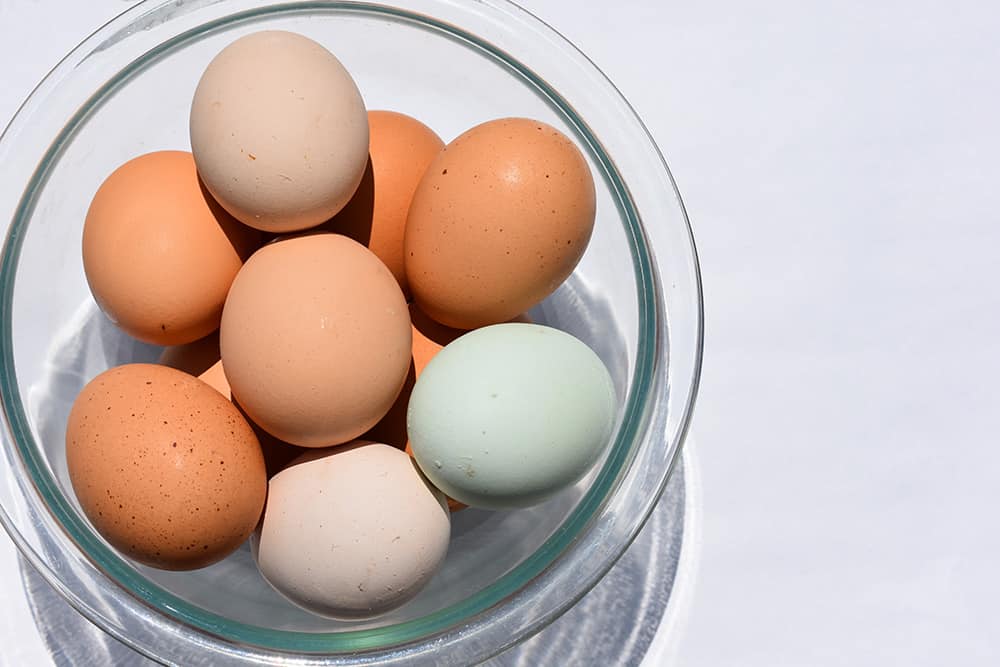

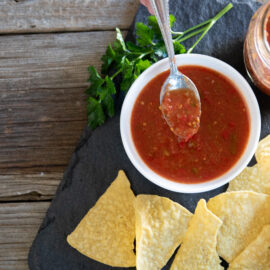
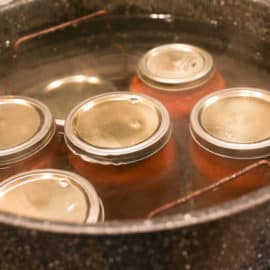
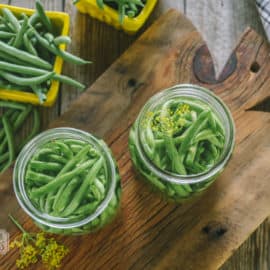
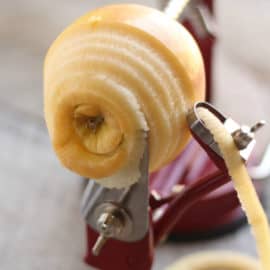
Can someone explain to me please why the water HAS TO BE chlorine free?? Since our water filter got turned off I’ve been using our tap and it has chlorine in it, sometimes quite heavily (community well).
There is a bio film on the fresh eggs called the bloom. Chlorine will destroy that.
You can leave chlorinated water in an open container for 24 hours and the chlorine will off-gass. Boiling and cooling will also get rid of the chlorine.
Can anyone tell me does the pickling lime settle on the bottom of the jar? Or how can you mix it
So it Dissolves?
It will not “dissolve” and become a solution. You can gemtly spin the jar to stir up the settles lime as you add eggs.
Thanks for a very informative article. Maybe it could be good though to tell that many (if not all?) european countries sell just unwashed eggs in the stores.
One question: Why does the container have to be sealed?
Duck eggs are dirty- so from my understanding washing or rinsing the dirt off is washing the bloom as well. So, is it okay to put the duck eggs in as is?
I have this same question. How do you preserve dirty duck eggs if you can’t rinse the dirt off first?
I have eggs that are stored in fridge but are unwashed. ( up to a month old). Can they be glassed & stored at room temp now ?
I have the exact same question —did anyone answer you?
I have the same question!
No once an egg is refrigerated it has to stay refrigerated or it will spoil. That’s why the instructions say “fresh” clean eggs. It’s best to do them pretty shortly after you collect them
I had a batch stored in pickling lime for almost a year. I went to take them out and a few were cracked does this mean the whole batch is ruined ?
My chicken girls lay free range and their eggs are dirty- so from my understanding washing or rinsing the dirt off is washing the bloom as well. So how do I prep the eggs for glassing?
I was wondering if I could gently clean those with a little more poop on them than others with a separate mixture of lime water? I know the bloom needs to stay intact, but how can I clean them?
Wipe gently any dry debris. No water. If you must scratch or clean the eat those dirty eggs first instead of ‘glassing’
If an egg breaks in your container, do you have to throw all the other eggs out? Or can you make a new batch of the lime water and keep the still-intact eggs?
I want this answer too!
Hello did anybody get am answer to the cracked eggs scenario?
Will the lime water evenly turn clear?
Can I use plastic containers?
I would like to know. I just pulled our batch from last Oct/Nov up for use. Found a couple of cracked eggs. The inner membrane still intact. I took them out. Opened up a couple other eggs and they appear fine.
So if the lime seals the eggs, how are they ruined if one cracked?
I went ahead and used the eggs in this container asap. Cook all eggs well/thru without issue. ?????
One cracked egg spoils the batch. Instead of doing a huge jar and losing them all, batch in I litre mason jars, if one cracks you only lose a few
Can you water glass farm fresh, clean unwashed eggs that have been refrigerated for a little while?
I’m wondering this too!
I have a question Im trying to water glass and my husband was helping me we put a little bit more pickling lime than it calls for. More like around 2.5 ounces than the one will the eggs still be ok?
Hi, I have been storing my eggs in hydrogenated lime for about 6 or so years. I go through about 70 dozen a year as it’s really all the eggs I use. I live on a boat year round and don’t get to town much, 2 or 3 times a year. Don’t mean to bust any bubbles but all my eggs come from Walmart or Costco or maybe Safeway, what can I say I’m a cheapskate. At any rate they are not fresh. The whites get a little runny after about 7 months, 12 months is the oldest I’ve used and they were good. If I want boiled eggs I just use a egg poacher. I have wanted to try petroleum jelly on the eggs as I put them in the bucket but doing about 35 dozen at a time I find I not only a cheapskate but a bit lazy. All so it might be noted I store the 5 gal egg buckets in the ocean water at between 50 to 32 degrees F,
So, you think it’s okay if the eggs might be a little older and have been refrigerated, as long as they have not been washed?
Thanks Ron, you’re the best. I like hearing from the boaters because they’ve done it all and generally aren’t too hung up on the particulars. Lol. I lived aboard my boat for 6 years in Hawaii and it’s still the fondest memory for me. I love that you kept your bucket in the ocean! Aloha 😉
Can I re-use the lime water solution, or do I need fresh?
Thanks for that information
I had a few broken eggs in my 5 gal bucket. I kept the rest and tried one. It was ok. Do I still have to throw the 8 other doz away? ;(
So, what do we do about a cracked egg in the container?
If there’s a cracked egg in your water glassed eggs, you need to figure out how long its been cracked. Here are your options: (1) If you cracked one while pulling another out, then you can react to that immediately and take care of your remaining eggs. You definitely don’t want to eat a cracked egg that you pull out of the water, but your other ones are probably salvageable. Take all the eggs out, throw away the cracked one, and refresh the lime/water solution. (2) If the broken egg was in the jar and sat on the shelf for a couple months, and/or the water is cloudy and has a bad smell to it, then you should probably throw it all out. (3) If the cracked egg in the jar was fairly recent, you MIGHT be able to save the rest of the batch. To try to save the batch, carefully remove all the eggs, discard the broken ones & add fresh lime/water mixture and return the non-cracked eggs back to the jar. In 2-3 days, check your container for smell. If it smells off, then the broken egg was in there too long & contaminated the entire batch. If they smell fine, you’re generally good to go, but you should use that jar first, and continue to monitor and scrutinize your eggs each time you open it to use them.
For all options: Remember: It’s better to be safe than sorry, so if there’s any doubt, throw it out.
Why does one cracked egg ruin the batch?
Can you reuse the lime solution? How do you safely dispose of the solution? I’m on septic and don’t want to pour it down a drain.
Ok. So I used fresh unwashed eggs but I refrigerated them before I water glassed them. I also used tap water. Do I need to discard them and start over? Can I just rince them off and put back in fridge and use them? It’s been about two weeks.
Can you water glass farm fresh, clean unwashed eggs that have been refrigerated for a little while?
I mixed the lime solution before adding my eggs but the lime quickly all settled to the bottom. Is this an issue?
I suggest watching Jill’s video here: https://www.youtube.com/watch?v=DOaYc6eVf9M&t=232s to see how your mix compares visually to hers. That should help!
What is the minimum time to water glass eggs if you keep adding fresh ones?
It would probably be best to batch eggs in waterglass solution. So instead of adding fresh eggs to the same jar as older eggs, start new jars for new eggs.
I did not use pickling like. I used gardening lime. Do you think I could pour that water out and replace it with pickling lime? Or do I need to toss them and start over? They have only been in the jar a month
They are completely different chemicals. Garden lime is calcium carbonate but pickling lime is calcium hydroxide.
We have roosters… Can I water glass fertilized eggs?
If the pickling lime water level went low (because I wasn’t checking on it regularly) can I still use the eggs that weren’t covered with the solution? They were coated well since the solution dried aroumd the eggs.
Please, someone let me know what you do when there is a broken egg in the jar?
If there’s a cracked egg in your water glassed eggs, you need to figure out how long its been cracked. Here are your options: (1) If you cracked one while pulling another out, then you can react to that immediately and take care of your remaining eggs. You definitely don’t want to eat a cracked egg that you pull out of the water, but your other ones are probably salvageable. Take all the eggs out, throw away the cracked one, and refresh the lime/water solution. (2) If the broken egg was in the jar and sat on the shelf for a couple months, and/or the water is cloudy and has a bad smell to it, then you should probably throw it all out. (3) If the cracked egg in the jar was fairly recent, you MIGHT be able to save the rest of the batch. To try to save the batch, carefully remove all the eggs, discard the broken ones & add fresh lime/water mixture and return the non-cracked eggs back to the jar. In 2-3 days, check your container for smell. If it smells off, then the broken egg was in there too long & contaminated the entire batch. If they smell fine, you’re generally good to go, but you should use that jar first, and continue to monitor and scrutinize your eggs each time you open it to use them.
For all options: Remember: It’s better to be safe than sorry, so if there’s any doubt, throw it out.
May I reuse my lime solution for my next batch next summer?.?
You should probably use a fresh batch of lime solution with each batch.
How do you safely dispose of the solution? Down the drain? Compost it? Thanks!
You can compost it in moderation. If you’re going to have gallons and gallons of it, that might mess with the pH levels of your compost too much.
I have started using eggs I stored in March. The white is runny, but so is the yoke. As long as it smells ok, do you think they are good or should they be dog food?
Thanks for that information
Can I gently wipe off excess straw, feathers and poo with a paper towel, without compromising the bloom. I read all the questions and comments and did not see this one addressed. Thanks so much.
Can the eggs be stored on the counter after being removed from the pickling line jar or do they need to be refrigerated? How long will they last after coming out of the jar?
Can I waterglass eggs that have been refrigerated for one month and are unwashed?
From what I’ve read, “The process of water glassing is only appropriate for fresh, unwashed eggs” so I don’t think one month old eggs will work. You could try freezing them! Learn more here: https://www.theprairiehomestead.com/2011/10/how-to-freeze-eggs.html
I am having trouble finding pickling lime. All I can only seem to come up with dill and bread and butter pickling lime.
Is there any way that you could let me know where you purchase yours?
I appreciate your response and have a wonderful Easter.
You can usually find it wherever you purchase canning equipment. A general hardware store, a large grocery store, Walmart, etc. You could also just purchase it online like on Amazon or a canning website.
Hi… please help me! I have 2, 1/2 gallon glass jars that I used to water glass almost a year ago. We are moving about 12 hours away and I would like recommendations on how to transport my eggs in the jars. Because they aren’t completely full to the top and the eggs move slightly, can I pack some fabric tool in the jars to make them snug. Or, can I put the eggs in egg cartons for the 12 he drive and as soon as I reach our destination put them back in the jars with fresh lime and distilled water mixture? I don’t want to loose them. Thank you in advance for any advice. Be blessed!
They should not be taken out and then put back in. Hopefully you can gently move them with cushions around the jars. Best of luck in your move!